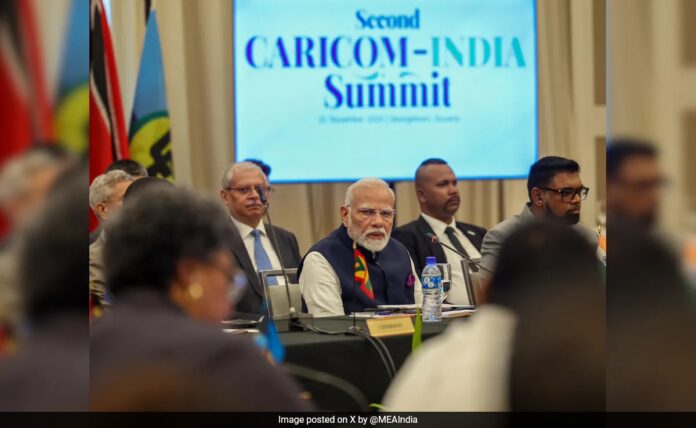The seven pillars listed by Modi also form the acronym C-A-R-I-C-O-M.
Georgetown:
Prime Minister Narendra Modi has proposed seven “key pillars” to strengthen ties between India and the Caribbean Community, asserting that New Delhi is “totally committed” to taking these relations to new heights.
Modi made the remarks on Wednesday as he joined leaders from the Caribbean partner countries for the second India-Caribbean Community (CARICOM) Summit here.
The prime minister arrived in Guyana earlier in the day — the first visit by an Indian head of the state in more than 50 years.
“PM @narendramodi co-chaired the 2nd India-CARICOM Summit, along with PM Dickon Mitchell of Grenada, the current chair of CARICOM,” the Ministry of External Affairs (MEA) said in a post on X.
Leaders at the summit discussed ways to strengthen ties in areas such as economic cooperation, agriculture and food security, health and pharmaceuticals, and science and innovations.
During the summit, Prime Minister Modi proposed seven key pillars to strengthen ties between India and CARICOM.
The seven pillars listed by Modi also form the acronym C-A-R-I-C-O-M. They are Capacity Building, Agriculture and Food Security, Renewable Energy and Climate Change, Innovation, Technology and Trade, Cricket and Culture, Ocean Economy and Medicine and Healthcare.
Emphasising that relations between India and CARICOM countries are based on “our shared past experiences, our shared present-day needs and our shared aspirations for the future”, Modi said, “India is totally committed to taking these relations to new heights.” “In all our efforts, we have focused on the concerns of the Global South and its priorities,” he said, according to a statement by the MEA.
Modi said, “To promote five Ts – trade, technology, tourism, talent and tradition, an online portal could be made to connect the private sector and stakeholders of all countries.” “India is moving ahead in the SME (small and medium enterprises) sector. During the India-CARICOM meeting last year, we announced a grant of one million dollars for SME sectors. We should focus on its implementation now,” he added.
Prime Minister Modi said, “We will also work to build a forensic centre for the CARICOM region. In India, we have made the iGOT Karmayogi portal to build constant ‘capacity’ for civil servants. This portal has online courses on technology, administration, law and education. A similar portal can be made for the CARICOM countries.”
In his closing remarks, the prime minister said, “I am pleased that India and all our CARICOM friends agree that reforms are necessary in global institutions.” “They need to mould themselves to today’s world and to today’s society. This is the need of the hour. In order to make this a reality, close cooperation with CARICOM and CARICOM’s support are very important,” he added.
CARICOM Heads of Government and the Prime Minister last met in 2019 on the margins of the 74th Session of the United Nations General Assembly (UNGA), where they discussed cooperation modalities in renewable energy and climate change through a USD 150 million credit line from India.
During the summit, Guyana President Irfaan Ali said, “(I want to) thank you and the people of India for your selfless attributes when you delivered to this region the first set of vaccines during the COVID pandemic.” Ali also said, “India has an influential voice in the international community. You are launching a device of the Global South. Your recent chairmanship of G20…underscores your commitment to advancing the aspirations of the Global South.” “We commend India’s unwavering commitment to the sustainable development of the region, especially in this intricate and interconnected era of globalisation, it is evident to us that the challenges we face can only be effectively addressed…” he said.
According to the MEA, there are around 3,20,000 people of Indian origin in Guyana.
The CARICOM is a grouping of twenty-one countries: fifteen Member States and six Associate Members, according to its website.
It is home to approximately sixteen million citizens, 60 per cent of whom are under the age of 30, and from the main ethnic groups of Indigenous Peoples, Africans, Indians, Europeans, Chinese, Portuguese and Javanese, the website said.
The prime minister arrived here from Brazil, where he attended the G20 Summit and also met with global leaders, including US President Joe Biden, French President Emmanuel Macron and UK Prime Minister Keir Starmer.
Earlier, Modi travelled to Nigeria, where he held bilateral talks with President Bola Ahmed Tinubu and interacted with the Indian community.
(Except for the headline, this story has not been edited by The Hindkesharistaff and is published from a syndicated feed.)




